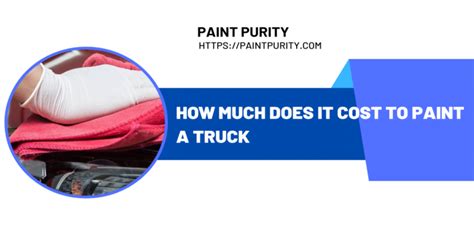Painting Your Truck: Costs & Benefits
Giving your truck a fresh coat of paint can dramatically improve its appearance and value. But before you dive into this project, understanding the costs and benefits is crucial. This comprehensive guide breaks down everything you need to know about painting your truck, from the financial investment to the long-term advantages.
What are the Benefits of Painting Your Truck?
A new paint job offers more than just a cosmetic upgrade. It provides several significant benefits:
-
Enhanced Appearance: This is the most obvious benefit. A fresh coat of paint can make your truck look years younger, restoring its shine and vibrancy. This is especially appealing if your truck has faded paint, rust spots, or significant scratches.
-
Increased Resale Value: A well-maintained truck, especially one with a professional paint job, commands a higher price in the resale market. Buyers are often willing to pay more for a vehicle that looks new and well-cared for.
-
Protection Against the Elements: Paint acts as a protective barrier against rust, corrosion, and UV damage from the sun. A new paint job extends the life of your truck's body and prevents costly repairs down the line.
-
Improved Curb Appeal: A shiny, well-painted truck simply looks better. This can boost your confidence and make you enjoy driving your truck even more.
How Much Does it Cost to Paint a Truck?
The cost of painting a truck varies significantly depending on several factors:
-
Type of Paint: Basic enamel paints are less expensive than premium urethane paints, which offer superior durability and shine.
-
Prep Work: This often accounts for a significant portion of the cost. It involves cleaning, sanding, rust repair (if needed), and priming the surface. Extensive bodywork will increase the overall expense.
-
Number of Coats: More coats of paint generally lead to a better, longer-lasting finish, but also increase the cost.
-
Labor Costs: The cost of labor can vary widely based on your location and the painter's experience. Professional shops typically charge more than DIY enthusiasts.
-
Truck Size: Larger trucks naturally require more paint and more labor, leading to a higher overall cost.
Cost Estimates: While precise cost estimations are difficult without knowing the specifics of your truck and project, you can expect to pay anywhere from a few hundred dollars for a DIY job with minor repairs to several thousand dollars for a professional, high-quality paint job on a larger truck requiring extensive bodywork.
What are the Costs of Different Types of Paint Jobs?
-
Basic Single-Stage Paint: This is the most economical option, providing a decent finish but often lacking the depth and durability of higher-end paints.
-
Two-Stage Paint (Basecoat/Clearcoat): This is a more common and durable option offering a superior shine and better UV protection compared to single-stage paint.
-
Custom Paint Jobs: These can significantly increase costs, as they involve intricate designs, special effects, and potentially custom mixing of paint colors.
How Long Does it Take to Paint a Truck?
The time required to paint a truck depends heavily on the extent of the prep work and the number of coats applied. A simple paint job with minimal prep work could take a few days, while a professional job with extensive bodywork could take several weeks.
Can I Paint My Truck Myself?
Painting your truck yourself is possible, but it requires skill, patience, and the right tools. If you're not experienced with automotive painting, you risk an uneven finish, drips, and other imperfections. A poor DIY paint job can actually decrease your truck's value. Consider the time investment, potential for mistakes, and the cost of materials before attempting a DIY project.
What are the potential problems with DIY painting a truck?
- Uneven finish: Lack of experience can lead to an uneven application of paint.
- Runs and drips: Improper application techniques can cause paint runs and drips, marring the finish.
- Poor adhesion: Inadequate preparation can result in poor paint adhesion, leading to peeling or chipping.
- Environmental concerns: Improper disposal of paint and solvents can harm the environment.
Conclusion: Weighing the Costs and Benefits
Painting your truck is a significant investment, but the benefits—enhanced appearance, increased resale value, and better protection—can outweigh the costs. Carefully consider your budget, the condition of your truck, and your painting skills before making a decision. If you’re unsure about tackling the project yourself, seeking professional help is always a worthwhile option for a top-quality, long-lasting result.

